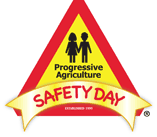National Farm Safety and Health Week is good time for parents to educate children on the dangers of grain.
 The 2011 harvest will soon be under way, and with National Farm Safety and Health Week occurring Sept. 1824, now is a good time to remind children how dangerous grain can be during harvest and throughout the year as it is transported and stored on the farm. Grain safety is often a high-priority topic during Progressive Agriculture Safety Days®, which teaches children 8 to 13 years of age things they need to know to remain safe and healthy on a farm or ranch.
The 2011 harvest will soon be under way, and with National Farm Safety and Health Week occurring Sept. 1824, now is a good time to remind children how dangerous grain can be during harvest and throughout the year as it is transported and stored on the farm. Grain safety is often a high-priority topic during Progressive Agriculture Safety Days®, which teaches children 8 to 13 years of age things they need to know to remain safe and healthy on a farm or ranch.Though grain may not seem to be an obvious risk on a farm or ranch, the dangers of grain during harvest, transport and storage may be deadly. Adults and children alike die every year from grain incidents that are highly preventable. 2010 was a record year for grain-related deaths. Fifty-one grain accidents occurred and 25 people died - five being children under the age of 16. The most common occurrences include suffocation when grain bridges collapse, or being trapped by flowing grain or by an avalanche of a vertical grain wall.
Grain safety is a high-priority topic.
"In a matter of 10 seconds, one can lose their life in flowing grain," says Bernard Geschke, program specialist for the Progressive Agriculture Foundation® (PAF). "Across agriculture, grain-related deaths occur far too often, and we believe it is critical to have this often unrecognized danger be a part of our education program."
What can parents teach their children to help them avoid a grain-related injury or death?
Always stay out of and away from grain bins and grain wagons even if grain isn't flowing. Bridged grain can unexpectedly collapse and submerge humans. It only takes three or four seconds for a human to become completely helpless in flowing grain.
Never try to save someone who is being entrapped by going into the grain yourself. Attempting to rescue someone without proper equipment and assistance may result in you being entrapped as well.
Always use a harness or rope and have a spotter when walking or working around grain. This way, your spotter can help pull you to safety or stop the flow of grain. Safety tips such as these are examples of the things children learn when they attend Progressive Agriculture Safety Days, which are held each year in more than 400 local communities throughout North America.
Safety tips such as these are examples of the things children learn when they attend Progressive Agriculture Safety Days®, which are held each year in approximately 400 local communities throughout North America.
Safety Days are fun, hands-on, one-day events that provide children with education and training that can keep them and those around them safer and healthier on a farm or ranch, and at home. The program explores more than 30 topics, including ATVs, firearms, water/outdoor safety and knife safety. PAF provides the curriculum, coordinator training, take-home bags, T-shirts and other resources to help make the Safety Days a reality. PAF is committed to providing farm and ranch safety and health education to children across rural America in an effort to reduce farm- or ranch-related injuries and death.
ABOUT PROGRESSIVE AGRICULTURE FOUNDATION
The Progressive Agriculture Safety Day program is the largest rural safety and health education program for children in North America and a program of the Progressive Agriculture Foundation, a 501(c)(3) charitable foundation. The Foundation's mission is to provide education and training to make farm, ranch and rural life safer and healthier for children and their communities. In 2008, PAF was awarded the Better Business Bureau Wise Giving Alliance National Charity Seal, demonstrating its commitment to accountability and ethical practices. Safety Day applications are due each July 15 for Safety Days that will be conducted the following calendar year.
09.17.2011